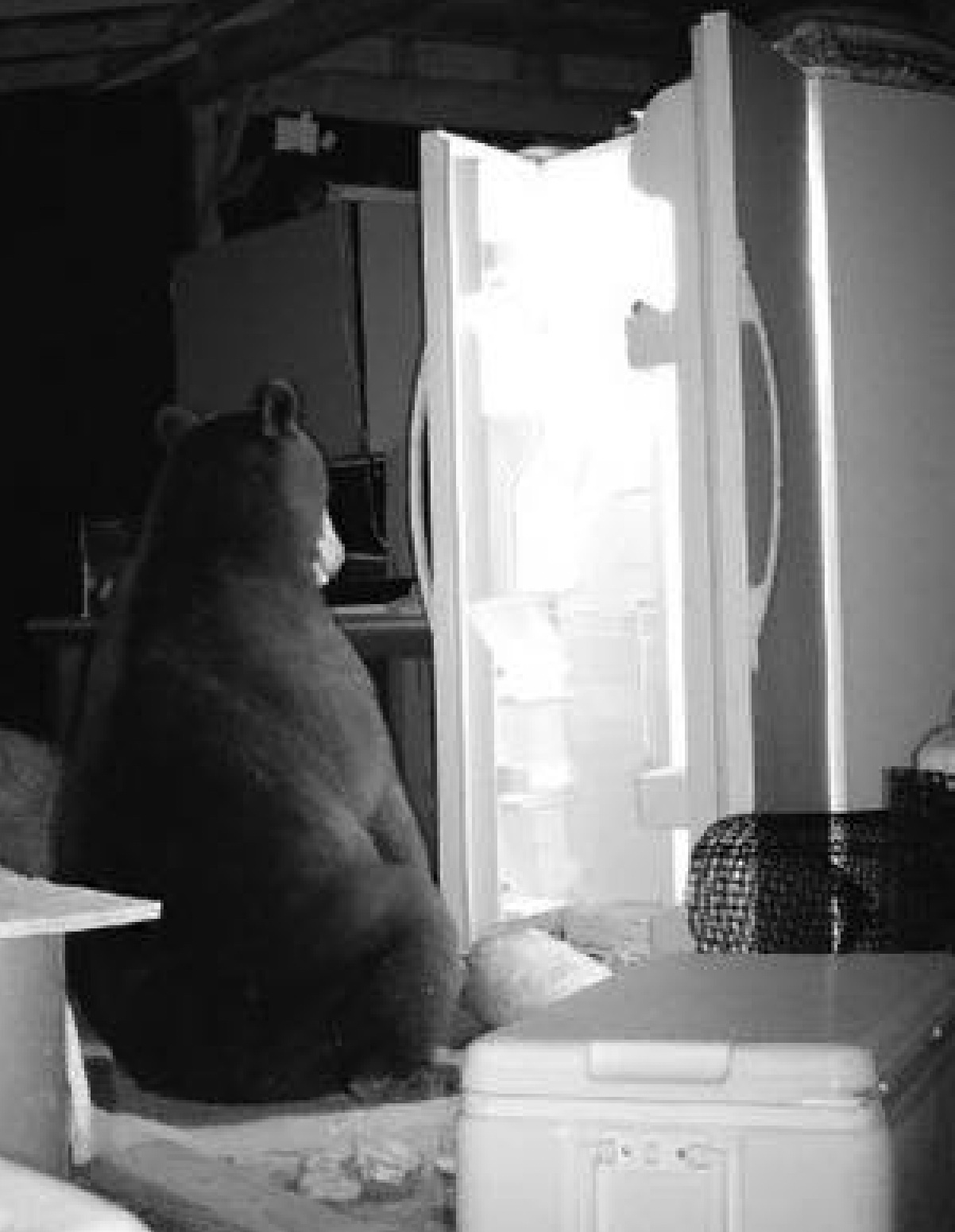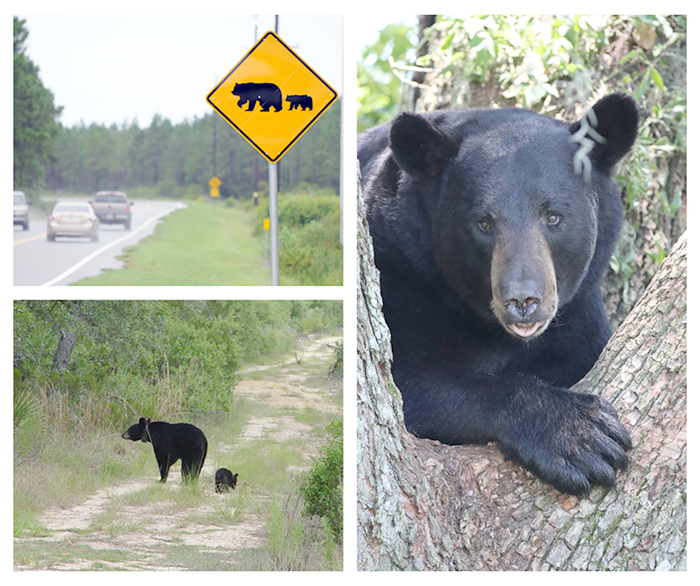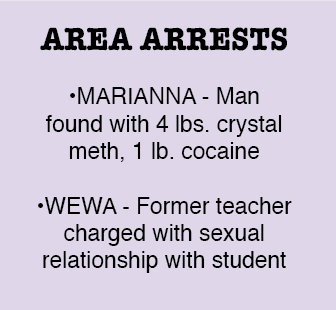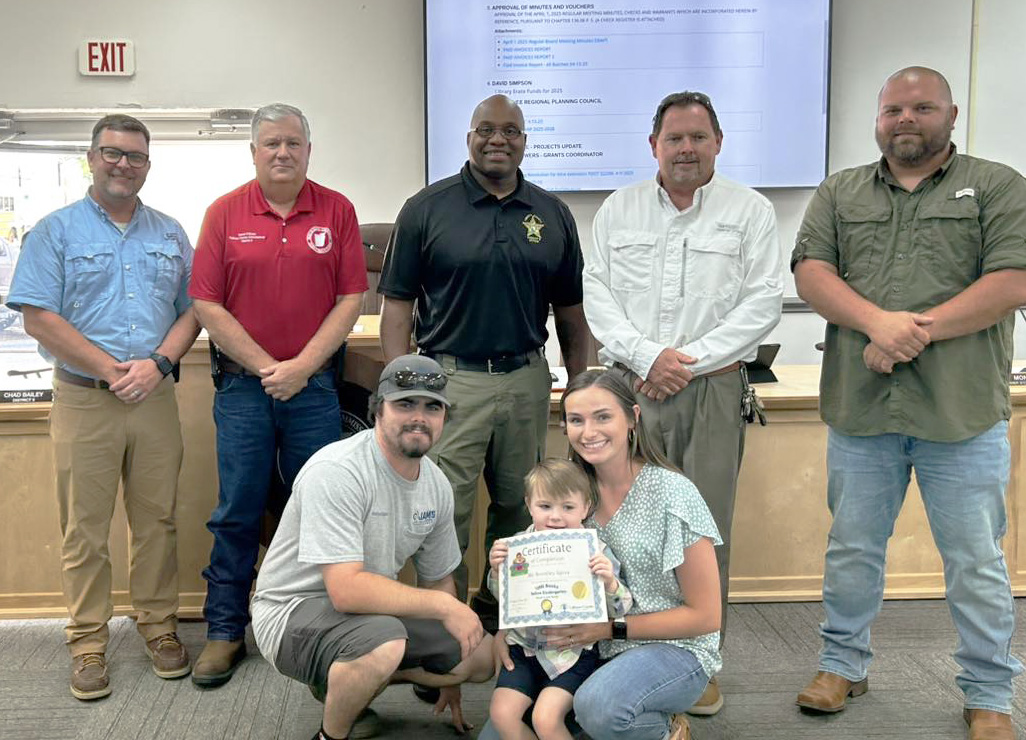Bear raids refrigerator in Telogia

Black bear helps himself
to fridge at Telogia home
TELOGIA, FL – Tommy Earnest of Telogia had an unexpected visitor recently – a large black bear that raided the refrigerator in the shed at his home.
The bear pictured here was caught on his game camera and seemed to be posing after opening the refrigerator door and looking back over his shoulder. At one point, the big black bear just sat down and stared into the fridge as if trying to decide what to taste next.
This was his second trip to the Earnest home; previously, he climbed up on the porch but didn’t make it inside the house.
“The first time he came he opened up a jar of mayonnaise and dropped the lid to the ground, ” Earnest said. He said the bear helped himself to some ham and left some pretty big bite marks in a couple of cans of beer. He also dipped into the garbage bin and grabbed some Hungry Howie’s take-out boxes in search of leftovers.
“They’re smart,” Earnest said, explaining that the bear also managed to get into a sturdy rubber ice chest that he was sure had been secured. The bear has also raided the fridge at his brother’s home next door and has been seen at several homes along Hwy. 67.
The animal is easy to recognize, he said, explaining, “He has a limp with his left paw.” But it didn’t seem to stop him from twice tearing down the family’s fencing at their home.
FWC has put up traps in the area but the bear has managed to elude capture.
The family’s first bear encounter was with a small cub sometime back in 2006. From that time until the past few weeks, Earnest said they not seen any bears on their property.
FWC has some recommendations (see below) to help homeowners discourage bears from going through garbage and entering buildings in search of food.

Bears discovered in
unexpected places &
what you should do
The Florida Fish and Wildlife Conservation Commission (FWC) is sharing the annual reminder that juvenile black bears might be seen in unexpected areas as they leave their mothers’ home ranges in search of new locations of their own to settle down. Spring also marks a general increase in activity for bears after limited movements in winter.
“Juvenile or yearling bears – between the ages of 1½ -2½ – start dispersing in spring and summer each year,” said the FWC’s Bear Management Program Coordinator, Mike Orlando. “The best thing people can do if they see a bear in an unexpected area is to give them plenty of space and to never approach or feed them and they will typically move along on their own.”
During this time of year, black bear sightings increase in suburban and urban areas, including in cities such as Tampa, Orlando, Jacksonville and others around the state. Seeing a bear in a neighborhood is not necessarily cause for alarm. However, it is important that people secure food attractants so that bears do not linger in the area. Generally, if a bear is not able to find food and is given space, it will move on. Feeding bears can make them lose their natural fear of people. It is also illegal in Florida to intentionally feed bears or leave out food or garbage that will attract bears.
Black bears are not generally aggressive, but like any wild animal, if they feel threatened, can become defensive. Dogs have been involved in over half of the incidents of people being injured by bears in Florida. When walking dogs, keep them close to you – ideally on a non-retractable leash – and be aware of your surroundings, which is good practice for preventing conflicts with any wildlife. Before letting your dog out at night in your yard, flip lights on and off and bang on the door to give bears and other wildlife a chance to leave the area.
As bears become more active this time of year, they cross more roadways. For your own safety and to avoid hitting bears and other wildlife, remember to slow down when driving, particularly on rural highways at dawn or dusk. Watch for road signs identifying bear crossing areas. Each year in Florida, an average of 300 bears are killed after being hit by vehicles.
If you have bears in your area, follow these additional BearWise® tips to help prevent conflicts with bears:
Secure food and garbage.
- Store garbage in a sturdy shed or garage and then put it out on the morning of pickup rather than the night before.
- If not stored in a secured building, modify your existing garbage can to make it more bear-resistant or use a bear-resistant container.
- Secure commercial garbage in bear-resistant dumpsters.
- Protect gardens, beehives, compost and livestock with electric fencing.
- Pick ripe fruit from trees and bushes and remove fallen fruit from the ground.
Remove or secure bird and wildlife feeders.
- Remove wildlife feeders.
- If wildlife feeders are left up, only put enough food out for wildlife to finish eating before dark and make feeders bear-resistant.
Never leave pet food outdoors.
- Feed pets indoors.
- If feeding pets outdoors, only put food outside for short time periods and bring in leftover food and dishes after each feeding.
Clean and store grills.
- Clean and degrease grills and smokers after each use.
- If mobile, store them in a secure shed or garage.
Alert neighbors to bear activity.
- If you see a bear, let your neighbors know.
- Share tips on how to avoid conflicts with bears.
- Encourage your homeowner’s association or local government to institute bylaws or ordinances to require trash be kept secure.
Having conflicts with bears? FWC staff are here to help — call the FWC regional office closest to you. To find the phone number for your region, go to MyFWC.com/Contact, and click on “Contact Regional Offices.”
If you spot an injured, orphaned or dead bear, feel threatened by a bear, or to report someone who is either harming bears or intentionally feeding them, call the FWC’s Wildlife Alert Hotline at 888-404-FWCC (3922).
More information is available at MyFWC.com/Bear, where you can access the “Guide to Living in Bear Country” brochure. Find additional ways to be BearWise at BearWise.org. Thirty-nine states, including Florida, support BearWise®, an innovative program that helps people learn ways to responsibly live around bears. Help us help bears and other wildlife by purchasing the Conserve Wildlife license plate at WildlifeFlorida.org/CWT.
Views: 425






